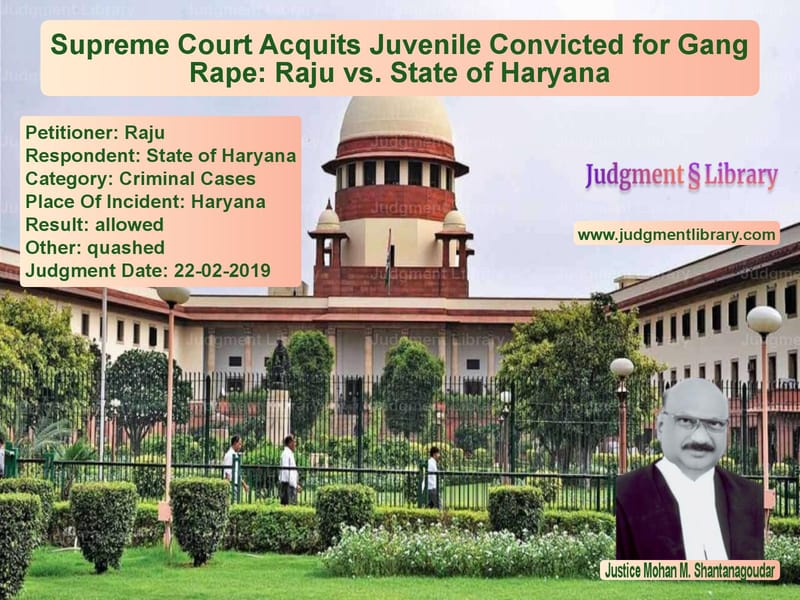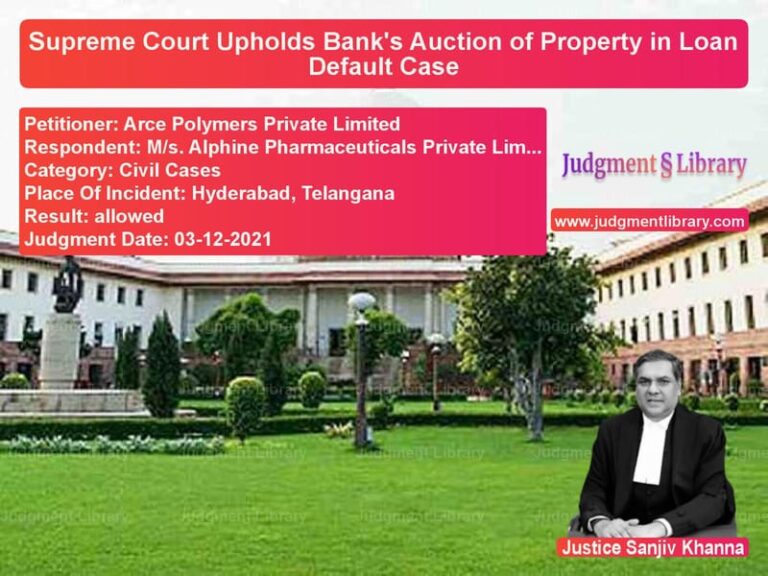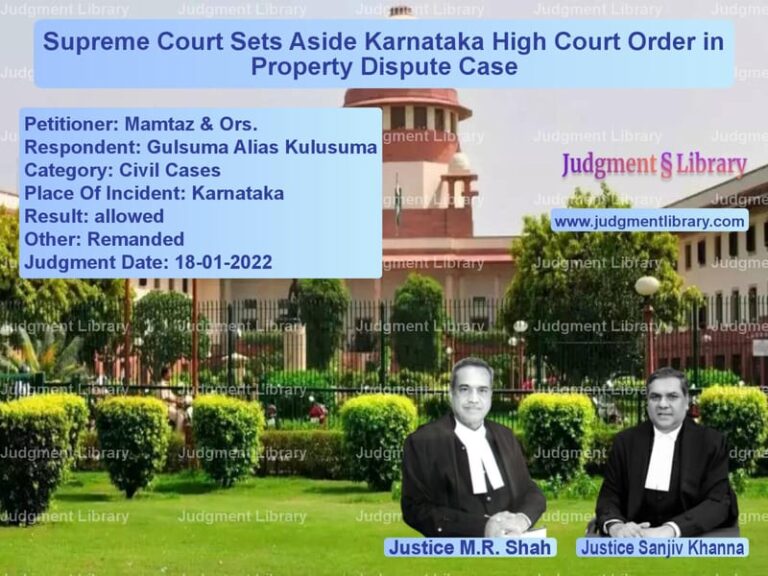Supreme Court Acquits Juvenile Convicted for Gang Rape: Raju vs. State of Haryana
The Supreme Court of India, in Raju vs. State of Haryana, set aside the conviction of an accused under Section 376(2)(g) of the Indian Penal Code (IPC) on the ground that he was a juvenile at the time of the offense. The case highlights the application of the Juvenile Justice (Care and Protection of Children) Act, 2000 and the legal principle that juvenility can be raised at any stage of proceedings.
Background of the Case
The case arose from an incident that took place on September 14, 2000, where the complainant, a 15-year-old girl, alleged that she was forcibly taken to a nearby field by three accused, including Raju (the appellant). She stated that two accused persons, Raju s/o Bhim and Raja @ Raj Kumar, committed rape on her, while the appellant Raju s/o Rajendar Singh stood guard.
Based on her statement, an FIR was registered, and all three accused were convicted under Section 376(2)(g) IPC. The Sessions Court sentenced them to 10 years’ rigorous imprisonment along with a fine of Rs. 500 each.
High Court Proceedings
The accused appealed before the Punjab and Haryana High Court. The appellant Raju raised a plea of juvenility, claiming that he was under 18 years of age on the date of the offense. However, the High Court dismissed his appeal and upheld the conviction.
Appeal Before the Supreme Court
Aggrieved by the High Court’s ruling, the appellant approached the Supreme Court, arguing that:
- He was below 18 years of age at the time of the offense.
- The trial court had failed to conduct an inquiry into his claim of juvenility.
- Under the Juvenile Justice (Care and Protection of Children) Act, 2000, his conviction was liable to be set aside.
To substantiate his claim, he presented a school transfer certificate from Dayanand Middle School, Sohna, Gurgaon, showing his date of birth as July 12, 1984. He also relied on a certificate from the Government Senior Secondary School, Sohna, which confirmed the same date of birth.
Supreme Court’s Observations
1. Right to Raise Plea of Juvenility at Any Stage
The Supreme Court reaffirmed that under Section 7A of the Juvenile Justice Act, a claim of juvenility can be raised at any stage, including after the final disposal of a case. The Court cited previous rulings, including Hari Ram vs. State of Rajasthan (2009), which held:
“A juvenile who had not completed 18 years of age on the date of the offense is entitled to the benefits of the Juvenile Justice Act. The claim of juvenility can be raised at any stage of proceedings.”
2. Inquiry by Registrar Judicial
The Court directed its Registrar (Judicial) to conduct an inquiry into the appellant’s age. The inquiry report determined that he was 16 years, 2 months, and 2 days old at the time of the offense. The findings were based on:
- School transfer certificates from two institutions.
- Verification of records by examining school authorities.
- Original school admission and withdrawal registers.
3. High Court’s Failure to Conduct Inquiry
The Supreme Court noted that the High Court had rejected the appellant’s plea without conducting a proper inquiry as required under Rule 12 of the Juvenile Justice Rules, 2007. It observed:
“The High Court failed to follow the mandatory procedure for determining juvenility. The appellant was entitled to an inquiry into his claim, which was not conducted.”
4. Applicability of the Juvenile Justice Act
The Court held that since the appellant was below 18 years at the time of the offense, the provisions of the Juvenile Justice Act were applicable. It ruled:
“As per Section 15(1)(g) of the Juvenile Justice Act, a juvenile cannot be sentenced to more than 3 years in a special home. Since the appellant has already spent 6 years in jail, his conviction and sentence are set aside.”
Final Judgment
The Supreme Court allowed the appeal and ruled:
- The conviction under Section 376(2)(g) IPC was set aside.
- The appellant was declared a juvenile at the time of the offense.
- Since he had already served more than 3 years in jail, he was released immediately.
- His bail bonds were discharged, and all proceedings against him were terminated.
Key Takeaways
- Juvenility can be raised at any stage: Even after conviction, an accused can seek relief under the Juvenile Justice Act.
- Mandatory inquiry under Section 7A: Courts must conduct an age inquiry if a claim of juvenility is made.
- School certificates are primary proof: Matriculation and school records are conclusive evidence for determining age.
- Juveniles cannot be sentenced as adults: A juvenile can be placed in a special home for a maximum of 3 years.
- Importance of procedural compliance: The High Court’s failure to conduct an inquiry led to the appellant’s wrongful conviction.
Conclusion
The Supreme Court’s ruling in Raju vs. State of Haryana is a landmark judgment reinforcing the protection of juveniles under the Juvenile Justice Act. It ensures that juvenility claims are assessed fairly and that no minor is subjected to adult punishment. This decision reaffirms the judiciary’s commitment to upholding juvenile rights and fair trial principles.
Petitioner Name: Raju.Respondent Name: State of Haryana.Judgment By: Justice Mohan M. Shantanagoudar.Place Of Incident: Haryana.Judgment Date: 22-02-2019.
Don’t miss out on the full details! Download the complete judgment in PDF format below and gain valuable insights instantly!
Download Judgment: Raju vs State of Haryana Supreme Court of India Judgment Dated 22-02-2019.pdf
Direct Downlaod Judgment: Direct downlaod this Judgment
See all petitions in Juvenile Justice
See all petitions in Bail and Anticipatory Bail
See all petitions in Custodial Deaths and Police Misconduct
See all petitions in Judgment by Mohan M. Shantanagoudar
See all petitions in allowed
See all petitions in Quashed
See all petitions in supreme court of India judgments February 2019
See all petitions in 2019 judgments
See all posts in Criminal Cases Category
See all allowed petitions in Criminal Cases Category
See all Dismissed petitions in Criminal Cases Category
See all partially allowed petitions in Criminal Cases Category







